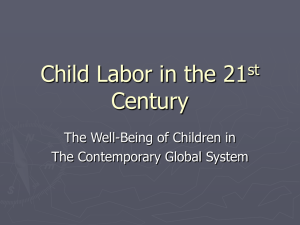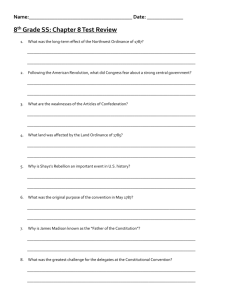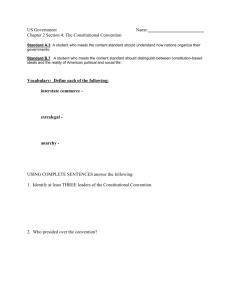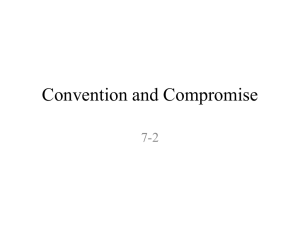The Constitutional Convention
advertisement
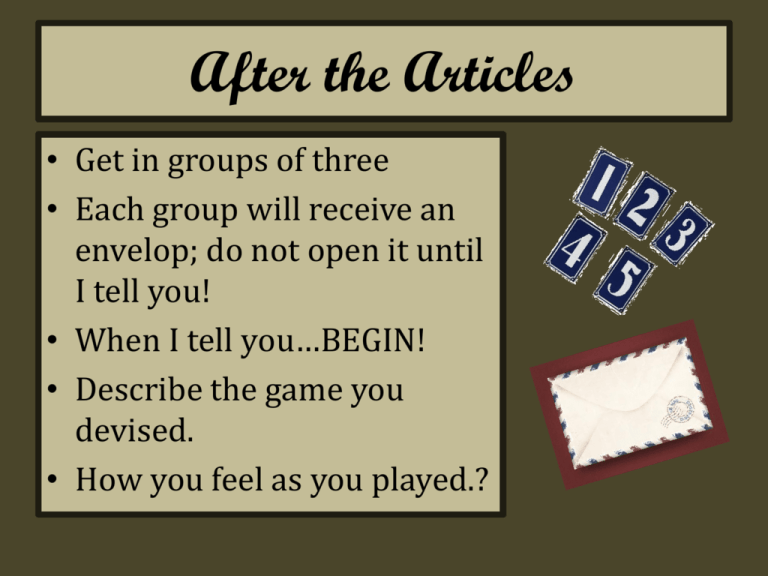
After the Articles • Get in groups of three • Each group will receive an envelop; do not open it until I tell you! • When I tell you…BEGIN! • Describe the game you devised. • How you feel as you played.? The Significance? • In May of 1787, outstanding citizens from 12 states gathered in Philadelphia. They planned to be there only a little while. They had come to improve the Articles of Confederation and try to create more unity and cooperation among the states. Rhode Island sent no representatives. How did those men feel that May? – Today, you used 12 paper clips. They represent the patriots who came from the 12 states. The die represents luck and each day that rolled around from May 25 to September 17. The Constitutional Convention A More Perfect Union: The Creation of the US Constitution • Let’s read the article together, and then address the discussion questions. • Homework: Complete the Convention Vocabulary. • Reason for the Convention: The U.S. had become convinced that the government under the Articles of the Confederation had several flaws. Can you name them? – The convention was to begin on May 14, 1787, but only eight delegates were present. – On May 25, 1787 after the majority of states were in attendance, the convention began. Independence Hall: Philadelphia Pennsylvania Where Declaration of Independence was adopted and the Constitution was written • Step #1: Read the biographies I’ve included in your binder. • Step #2: Conduct further research on your delegate using the resources I’ve included in the front pocket of your binder to gather more information. • Step #3: Answer the questions under “Day One: Homework” • Step #4: Create your delegate’s placard (Name & Home State) The President & the Secretary • George Washington – President of the Convention • Only spoke once during those long, hot months. – I will not interfere unless it gets unprofessional, offtopic, or we need to call a vote/ move onto the next issue. • William Jackson (S.C.) – Secretary – Since William Jackson is not represented here, we need to elect our own Secretary who will record all the notes for the Convention. The Rule of Secrecy • "That nothing spoken in the house be printed, or otherwise published or communicated without leave." Rules, Rules, Rules • How many rules did the actual delegates devise? – 16 and then 6 more • Caucus with your state and other delegates from similarly sized states (S/M, L), and come up with the rules you feel we should have as a convention. – What is expected from each of you? – How will we conduct ourselves? Ladies..ahem, Gentlemen… • Should we keep the Articles of Confederation? – What were we sent here to do? – Why should we keep them? – What’s our other option? Tonight’s Assignment • Read: Questions on Legislative Branch… – After reading it, decide how your delegate would feel about the issues and then brainstorm a prepare your speeches/arguments for tomorrow. (Record this in your packet.) – Be ready to debate tomorrow. • EXTRA HOMEWORK: – Virginia Delegation: Read Virginia Plan – New Jersey Delegation: Read NJ Plan – Alexander Hamilton: Read Hamilton’s Plan – Roger Sherman: Read The Great Compromise Opening Question: • For what reason did most delegates believe they were meeting? • What did we decide yesterday? The Legislature • Please make sure you are sitting next to/near the delegate from your state – Caucus with other state members or likeminded delegates what you read last night. • • • • Virginia Delegation meet alone Small States Caucus (DE, NH, NJ, GA) Medium States Caucus (CT, MD, SC, NC) Large States Caucus (MA, NY, PA) The Virginia Plan • May 29, 1787 Edmund Randolph from Virginia submitted and defended a set of 15 Resolutions known as the Virginia Plan the to the Convention • 3 Branches—legislative, executive, and judicial • Wanted representation based upon population • Highly centralized gov’t would have veto power over state laws • Key issue (as stated by G. Morris of PA) was the difference between: – Federation—a mere compact resting on the good faith of the parties, shadow government fragmented and hopelessly ineffective – National Government—complete and mandatory operation; supreme power capable of exercising the necessary authority The New Jersey Plan • June 14, New Jersey (William Paterson) requested postponement of Virginia Plan to present an alternative plan. • Called only for revisions to the A of C – Make Congress better able to raise revenue – Regulate commerce – Let it ratify treaties as the “Supreme Law of the States” – They wanted 1 vote one state as they were guaranteed under the A of C Hamilton’s Plan • Called for a government just like Britain’s which he claimed was the “best in the world” – Lower house popularly elected (3 years) – Upper house elected by electors (LIFE!) – Executive elected by electors (LIFE!) – Judiciary (LIFE!) – National government absolute veto power over states • This scared the other states! – Why would he want this system? Duh! The Great Compromise • Roger Sherman, proposed a twohouse legislature: – Senate and a House of Representatives. – The Senate would have an equal number of representatives from each state. • This would satisfy the states with smaller populations. – The House of Representatives would include one representative for each 30,000 individuals in a state. • This pleased states with larger populations. Representation For Tomorrow • Please read the article on Slavery. • Make sure you complete the questions that follow the article! Beginning Today’s Debate • Please discuss with your caucus the following: (but today, caucus regionally) – What are the powers of states vs. the Federal Congress…who should have ultimate power? • Let’s Debate! Slavery & Representation • “On August 21 Martin of Maryland proposed a tax on slave importation, the convention was thrust into a strident discussion of the institution of slavery and its moral and economic relationship to the new government.” Arguments For & Against Slavery For Slavery • C. Pinckney stated, "if slavery be wrong, it is justified by the example of all the world." • Rutledge warns that North Carolina, South Carolina and Georgia will not sign the Constitution without certain slavery protection clauses. Arguments For & Against Slavery Against Slavery • Samuel Hopkins of CT—“How does it appear…that these states, who have been fighting for liberty and consider themselves as the highest and most noble example of zeal for it, cannot agree in any political Constitution, unless it indulge and authorize them to enslave their fellow men…AH! These unclean spirits, like frogs, they like the Furies of the poets are spreading discord, and exciting men to contention and war.” Slavery Debate! • How will slaves count toward representation? • Should the slave trade continue or cease? If so, when? • Should Congress be allowed to tax imported slaves? • Caucus and then debate! The Convention’s Decision • Article 1, Section 9 • The Migration or Importation of such Persons as any of the States now existing shall think proper to admit, shall not be prohibited by the Congress prior to the Year one thousand eight hundred and eight, but a Tax or duty may be imposed on such Importation, not exceeding ten dollars for each Person. The Convention’s Compromises • Southern victory: No bans or restrictions on the Atlantic slave trade for 20 years (until 1808) • Northern victory: Taxes were imposed on all imported slaves (a Tax or duty may be imposed on such Importation, not exceeding ten dollars for each Person.) • Southern victory: The same day this agreement was reached, the convention also adopted the fugitive slave clause, requiring the return of runaway slaves to their owners. The 3/5 Compromise • Representatives and direct Taxes shall be apportioned among the several States which may be included within this Union, according to their respective Numbers, which shall be determined by adding to the whole Number of free Persons, including those bound to Service for a Term of Years, and excluding Indians not taxed, three fifths of all other Persons . • What was the 3/5 Compromise? – 1 free person/one vote – 3/5 of all other people for the purposes of taxation and representation – Preserved the practice of slavery • Slave trade would continue until 1808 (20 yrs.) Madison’s Words “Twenty years will produce all the mischief that can be apprehended from the liberty to import slaves." He also "thought it wrong to admit into the Constitution the idea that there could be property in men." How it plays out… • 1793 slave states would have been apportioned 33 seats in the House of Representatives had the seats been assigned based on the free population; instead they were apportioned 47 • In 1812, slaveholding states had 76 instead of the 59 they would have had • In 1833, 98 instead of 73. 1. Should we have an executive? Why or why not? 2. How many executives should we have (if we have any)? 3. What powers will the executive(s) have? 4. How should the president be elected? Legislature? Direct election? Other means? 5. What qualifications must the president meet in order to become president? 6. How long should s/he/they serve? 7. Can they be re-elected? If so, how many times? • Agreed on Electoral College with majority of electoral votes needed for the election of the Executive. • Agreed (nem con) that the President should be: 1. Natural-born citizen, or born abroad, but only to parents who were both citizens of the U.S. 2. A permanent resident for 14 years in the USA 3. Be 35 years of age. • Term of the President is 4 years • Job of the President: – Sign or veto legislation – Commander-in-chief of the military – Directs US foreign policy – Chief executive – "take(s) care that the laws be faithfully executed.” – Power to nominate federal judges – May grant pardons The Judiciary • Should we have a national court system? Why or why not? • If so, how should it be set up? • How long should the term of office be for a justice? • Should they be able to serve more than one term? If so, how many? The Judiciary • Proposal: A “Council of Revision” to review all bills passed by the legislature BEFORE they went into effect? – So basically, for a bill to become law, the President AND the Judiciary (Supreme Court) would have to approve said bill… – This is called PRIOR REVIEW Gerry & King • Both objected to allowing the Judiciary the power of prior review…why?!? – Bias…If the judges helped to make the laws, how could they possibly then say that the laws were UNCONSTITUTIONAL? The Supreme Court • Article II establishes the President’s right to nominate justices subject to Senate approval • Article III further provides that "[t]he Judges, both of the supreme and inferior Courts, shall hold their Offices during good Behavior, and shall, at stated Times, receive for their Services, a Compensation, which shall not be diminished during their Continuance in Office.“ – For life…or until they retire! Powers of the Supreme Court • Original Jurisdiction is restricted to the following – Dealing with international treaties – Dealing with ambassadors – Dealing with maritime (sea) jurisdiction – Conflicts between two or more states, – Dealing with foreign states, citizens or subjects What is Judicial Review? • The actions of the Executive (President) and Legislative (Congress) branches are able to be reviewed by the Judicial branch (the Supreme Court). – One of the key “checks and balances” in our government – Supreme Court can override existing law and create new law through appellate jurisdiction Reflection & Analysis • What was the most challenging part of the convention? Explain. • What did you learn from the experience? • Did it change how you thought about our Founding Fathers? If so, how? • What did this taste of “democracy in action” do to the groups in the class (Ex: North, South, Large State, Small State, etc…) Next Week: Exam • Study guide: Please use the Simulation folder and the PowerPoint to prepare. • Exam will consist of multiple choice, matching and essays. –Total Points: 50

